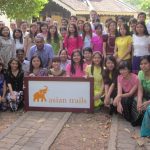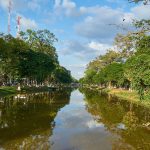Sustainable tours that benefit host communities
Sustainable tours that benefit host communities
My name is Ameer Virani and I am Asian Trails’ group sustainability coordinator based in Hoi An, Vietnam. My role involves leading the development and implementation of our sustainability agenda, in coordination with company management.
This process is supported by a team of sustainability coordinators, of which we have one in each country. They come from a range of different departments and are our destination-specific sustainability experts.
Asian Trails’ sustainability agenda includes a range of activities, ranging from plastic reduction and animal welfare initiatives on the ground, to managing our own company environmental footprint.
Sustainability is one of the company’s core values and our efforts have been recognized by Travelife, an international travel industry sustainability programme. We have achieved Travelife partner status in all of our countries.
One important element of our sustainability agenda is the impact we create on the ground through our excursions and tours. We have, for many years, been developing and operating impactful products that respect and contribute to local people and places.
In 2019, we embarked on a project to categorise all our tours into Trails, for example Active Trails, Culinary Trails, Essential Trails etc. One such category was Sustainable Trails. This was the first time we planned to actively promote the sustainability characteristics of the sustainable tours we had been selling for a long time already.
Therefore, in 2020, we started the process of evaluating the sustainability credentials of all our day excursions and multi-day tours in order to identify the most sustainable ones, which were to be officially categorised as Sustainable Trails. These are our most impactful products, in that they minimise negative impacts on the environment and maximise positive impacts on the local economy and communities to a great extent.
The evaluation process to identify our Sustainable Trails was a rigorous one, led by myself as group sustainability coordinator and each country’s product teams. We put to use a strict set of evaluation guidelines that assessed the extent to which each of our excursions and tours meet the criteria of our six ESTEEM principles. These principles of sustainability were first created by our Vietnam office in 2018 and have since been used as the basis of our work in sustainable product development:
- Eat Locally – Local dishes using local ingredients from local suppliers are served during meals.
- Stay Eco-friendly – Stay overnight at an eco-lodge, homestay, tent, or hotel which is classified by a third-party, or Asian Trails as environmentally-responsible.
- Transport Alternatively – Environmentally-friendly activities or transport are included as an alternative to CO2-emitting activities or transport.
- Experience Meaningfully – Organised cultural or environmental learning experiences for travelers where local providers receive direct income for specific services.
- Empower Viably – Taking part in community-led or community-managed activities or experiences where local people can improve their lives from an economic and/or professional development perspective e.g. community-based tourism.
- Make A Difference – Financial or in-kind contributions to a social or environmental organisation or cause are included.
Products which meet the criteria for three or more of the above six ESTEEM principles are categorised as Sustainable Trails. Our sales teams can share with you a complete list of Sustainable Trails in each country, along with detailed information about what makes them sustainable.
For example, our ‘Shinta Mani Wild’ tour in Cambodia includes organic Khmer cuisine, tented eco-resort accommodation and immersive experiences that provide meaningful support to local communities. In Indonesia, our ‘Bali Eco Walk’ is a walking excursion led by a skilled local community guide and includes a lunch which directly supports local families. In Thailand and Vietnam, our ‘Two Days Homestay at Phrao’ and ‘Two Days Escape to Mai Hich’ tours promote locally-produced food, traditional homestay accommodation and direct support to underserved, rural communities.
These are just a few examples of our Sustainable Trails and we have well over a hundred of them across our countries of operation.
Of course, this does not mean to say that products which have not been categorised as Sustainable Trails are bad for the environment, economy and communities. However, it does mean those products are not as impactful and we are working hard to improve their sustainability characteristics. In addition, the ESTEEM guidelines introduced above are not only a means to evaluate our existing products, they also provide a valuable framework to base all our future product development on.
This entire process is part of our mission to become an increasingly responsible DMC. We strongly believe that developing and operating more sustainable products is one of, if not the most effective ways to ensure our business can make a positive difference to local people and places.



